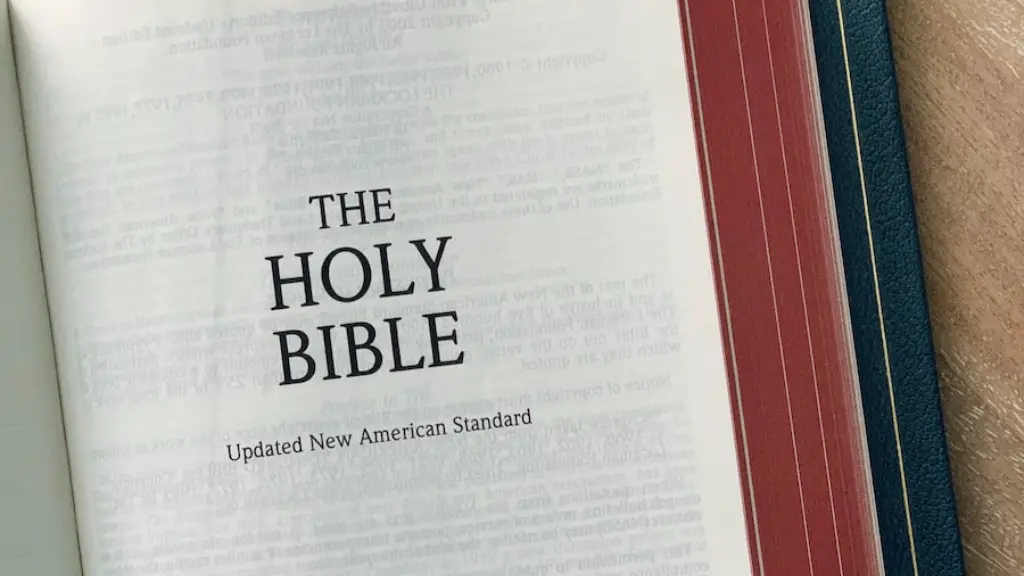What is Consecration in the Bible?
It is important to understand what consecration in the Bible means and how it is used in practice. In the Bible, consecration is a religious act in which something or someone is separated from the world, dedicated to God, and set apart as holy. It is a way of offering something, most commonly a person, place, or object, to God to be used exclusively for His service. In the Bible, the concept of consecration is often linked to the idea of being ‘sanctified’, or ‘made holy’ by God.
When someone is consecrated in the Bible, they are taking a decision to set apart their life or their possessions as a living sacrifice of love and service to God, and that commitment is accepted by Him. In the ancient world, consecration often involved the use of rituals and the making of certain vows, such as those found in the Old Testament, which were taken by individuals when they wished to dedicate themselves or something to the Lord.
In the New Testament, Christ’s death on the cross is seen as the ultimate act of consecration and self-sacrifice, which gives believers an example to follow. This kind of commitment is often seen in the language of being ‘given up’ to God, with the intention that we would be completely devoted to Him and His mission.
The Bible also speaks of believers being consecrated to the Lord in many different ways, including through baptism, the laying on of hands, and the presentation of offerings. Through these acts, believers are committing themselves and their possessions to God’s service, accept their place in His kingdom, and acknowledge Him as Lord and Master.
Application of Consecration
Consecration can be applied to different aspects of life and practice. For example, when a person sets apart their life for God’s service, this might involve dedicating their finances to His kingdom. This could include tithing, charity, and other forms of sacrificial giving to those in need. In addition, dedicating one’s time and energy to causes and activities that honor God and further His kingdom is a form of consecration.
Consecration can also apply to specific items of worship, such as the Lord’s table, the furnishings of a church, and other areas of sanctified use. Taking part in sacraments such as Communion and Baptism are often seen as acts of consecration since they are outward expressions of our commitment to God and His kingdom.
The commitment made through consecration is more than simply a gesture of devotion. It is an agreement between God and believer to set apart and serve Him with unwavering obedience and loyalty. It is a reminder of the trustworthiness of His grace and the new life we have in Christ, and it is a pledge to honor His holiness and love.
The Impact of Consecration
The impact of consecration is twofold. On the one hand, it is a declaration of a believer’s faith and submission to God’s will, and on the other hand, it is a tool for guiding believers how to live daily. It is a way of dedicating our lives to God, and it helps us to see ourselves as His servants, always seeking to honor Him in our words and actions.
For the believer, consecration impacts every area of life. It shines a light on our need to reject the world’s values and live according to the values of God’s kingdom, and it helps us to make decisions based on our desire to obey God rather than to please ourselves.
Ideally, consecration is a continual process within the life of a believer. It is an ongoing reminder that God is at work in all aspects of our lives and that He is our Lord and Savior. In times of complacency and frustration, it helps us to remember that God has plans and purposes for us, and it is our commitment to Him that will sustain us during the darkest times of life.
Spiritual Benefits of Consecration
One of the spiritual benefits of consecration is that it helps to strengthen our relationship with God. As we set aside our own interests and willfully submit to Him, we can be increasingly assured of His presence in every area of our lives. His love and grace become more deeply rooted in our hearts, and our understanding of His purposes in our lives is extended.
Consecration also serves as a reminder that our lives are no longer our own. We have been bought with a price, and our freedom belongs solely to Him. In that sense, a life of consecration is a powerful statement of who we are and what we believe—a life committed to the Lord and His kingdom.
Example of Consecration in the Bible
One of the most powerful examples of consecration in the Bible is found in the Old Testament, when Jesus was circumcised at eight days old in accordance with God’s law. In this act, Jesus was publicly declaring His commitment to God and His kingdom, and He was symbolically handing over control of His life and His destiny to the Lord.
The act of Jesus’ salvation was a profound act of consecration, and it is an example to us all of what it means to surrender completely and wholly to the Lord. It reminds us that the Spirit of God is at work in all of our lives, and that He desires our holiness even above our own.
The Power of Consecrating Our Homes
Consecrating our homes is a way to make them a sanctuary for the Lord wherein we can honor Him and establish a righteous atmosphere. This could include setting aside a room or wall as a place to pray and to worship, dedicating certain objects to God’s service, and using the home as an expression of love for God and His kingdom.
Furthermore, consecrating our homes can bring us into a peaceful sense of the Lord’s presence, and it can be an anchor of safety in a world full of turmoil. It can also be a reminder to us of our need to live lives that reflect the kingdom of God, and it can help us to take every opportunity to minister to others in our home and our community.
The Power of Consecrating Our Speech
Consecrating our speech is another way of honoring the Lord and living in obedience to His will. It involves speaking words of love, peace, and edification and avoiding words that are offensive, unhelpful, and untrue.
It is a commitment to not use our words to hurt, manipulate, or control others, but to instead use them to build up and encourage those around us. This can also involve speaking words of gratitude and praise to God, and meditating on His Word and His promises publicly, as well as in times of prayer.
The Power of Consecrating Our Minds
Consecrating our minds is also a form of consecration, and it involves bringing our thoughts and imaginations into captivity to the Lord. This involves being intentional and disciplined about what we allow into our minds and how we spend our time, being mindful of the activities and conversations that we choose to be a part of and avoiding those that are not edifying.
It is important to recognize how powerful our minds can be and the impact that our thoughts can have on our lives and our relationships. Consecrating our minds to the Lord can be a powerful reminder that our thoughts and imaginations are ultimately subject to His will and mercy, and can help us to cultivate an attitude of humility and obedience to His Word.
The Power of Consecrating Our Physical Bodies
Consecration can also have a powerful impact on our physical bodies, as we set aside all forms of self-indulgence and instead take care of the temple that God has given us. This means taking care of our health and wellbeing by eating nutritious food, exercising regularly, and getting adequate rest, as well as abstaining from activities that have a detrimental effect on our health.
This could also involve taking part in activities that help to build our bodies in strength and endurance, such as cycling, swimming, running, and weightlifting, depending on the individual. And, ultimately, it is about recognizing our physical bodies as part of ourselves, but ultimately belonging to God, and being mindful to not use them for selfish ends.
The Power of Consecrating Our Time
Lastly, consecrating our time is a way to prioritize the things of God in our lives and make sure that we are spending our days devoted to His service. This means ruthlessly cutting out those activities and commitments that are not living up to our spiritual ideals, and being intentional and purposeful about how we spend our time.
It also means being intentional about the activities we choose to take part in, making sure that they are activities that are edifying and that honor the Lord. This could involve taking part in Bible studies, attending friendship groups and retreats, or engaging in spiritual conversations with others.
Ultimately, consecrating our time means that we are able to put the things that are truly important in our lives first, and it is a reminder to us of our daily commitment to living out the values of the Lord’s kingdom.


